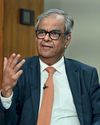By 2030, India will have at least seven mega cities with a population of over 10 million and nearly 50 cities that are at least a million strong. Sustainable mobility solutions will be needed, which is where technology will make a big difference. India has also made commitments for climate action and clean energy development. So, sustainable mobility is a need rather than a want, and it is imperative to develop a widely accepted and available ecosystem that supports electric vehicles, says Pawan Goenka

The common narrative, when it comes to adoption of electric mobility in India is that it will be disruptive. Together with shared economy and connected automobiles, we anticipate a tremendous upheaval in the automotive industry. Not too far in the future, we see an enormous change in the way people and cargo move. What’s heartening is that this new era of mobility will cause a positive disruption.
At present, there are many questions raised on electric mobility: charging infrastructure, clean and sustainable energy options, access to lithium reserves, range anxiety, wellto-wheel analysis, shifting of dependence from fossil fuels to metals and rare earths, government subsidies and more. All of them are valid. But they tend to derail the main reason why we need sustainable mobility — India’s critical need as well as its commitment to climate action and clean energy development.
Power of Innovation
No one has seen the future, but that does not mean we cannot make informed decisions and act accordingly. For example, when we start work on an all-new vehicle, we have to anticipate and predict how it will be received by customers on an average four years later. Similarly, for sustainable mobility solutions, we know that the way forward is electric. It’s just that the lead time for customer acceptance is longer. Disrupting the 130-year-old automotive industry – comprising not just OEMs but vast supplier networks, distribution partners as well as other important stakeholders – is obviously not going to be an overnight phenomenon. But the building blocks are being put in place.
この記事は Business Today の January 13, 2019 版に掲載されています。
7 日間の Magzter GOLD 無料トライアルを開始して、何千もの厳選されたプレミアム ストーリー、9,000 以上の雑誌や新聞にアクセスしてください。
すでに購読者です ? サインイン
この記事は Business Today の January 13, 2019 版に掲載されています。
7 日間の Magzter GOLD 無料トライアルを開始して、何千もの厳選されたプレミアム ストーリー、9,000 以上の雑誌や新聞にアクセスしてください。
すでに購読者です? サインイン

"Inaction is worse than mistakes"
What was the problem you were grappling with?

TEEING OFF WITH TITANS
BUSINESS TODAY GOLF RESUMES ITS STORIED JOURNEY WITH THE 2024-25 SEASON OPENER IN DELHI-NCR. THERE ARE SIX MORE CITIES TO COME

AI FOOT FORWARD
THE WHO'S WHO OF THE AI WORLD GATHERED AT THE TAJ MAHAL PALACE IN MUMBAI TO DELIBERATE THE TRANSFORMATIVE IMPACT OF AI ON INNOVATION, INDUSTRIES, AND EVERYDAY LIFE.

Decolonising the Walls
ART START-UP MAAZI MERCHANT IS ON A MISSION TO BRING INDIA'S FORGOTTEN ART BACK HOME

"I'm bringing Kotak under one narrative, one strategy, one umbrella”
Ashok Vaswani is a global banker who spent most of his career overseas at institutions like Citi Group and Barclays, among others.

CHOOSING THE CHAMPIONS
The insights and methodology behind the BT-KPMG India's Best Banks and NBFCs Survey 2023-24.

'INDIA IS AT AN EXTREMELY SWEET SPOT'
The jury members of the BT-KPMG Survey of India's Best Banks and NBFCs discuss developments in the banking sector and more

FROM CRISIS TO TRIUMPH
Dinesh Kumar Khara stewarded SBI through multiple challenges during his tenure, while ensuring that profits tripled, productivity soared, and the bank consolidated its global standing

AT A CROSSROADS
BANKS ARE FACING CHALLENGES ON BOTH SIDES OF THE BALANCE SHEET-ASSETS AS WELL AS LIABILITIES-WHICH ARE PUTTING PRESSURE ON MARGINS.

EXPANSIVE VISION
Bajaj Finance, an outlier in terms of digitisation, faces stiff competition. But it continues to expand its reach